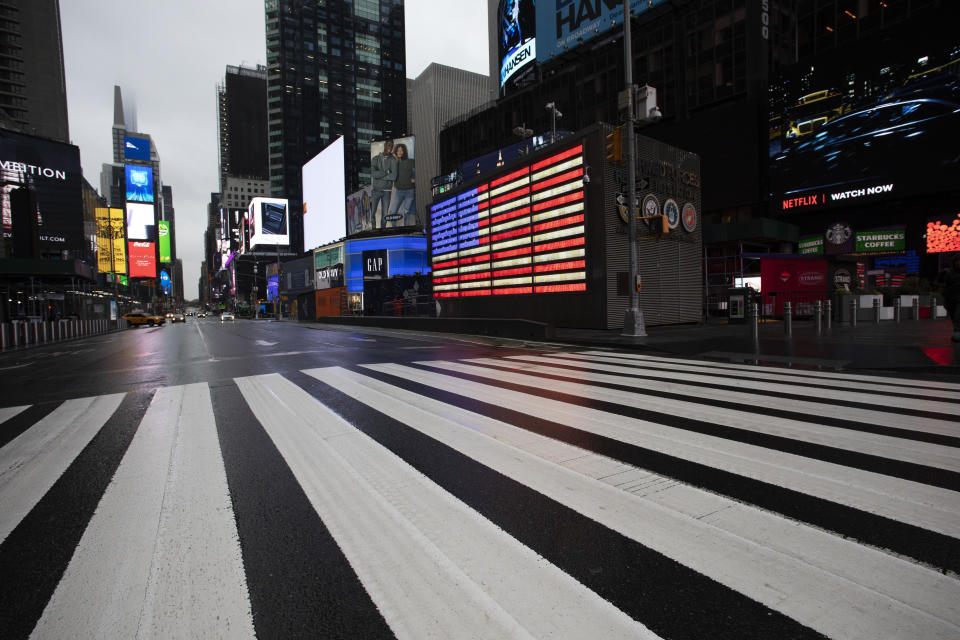In the coronavirus pandemic, carbon emissions have fallen, but climate change remains an existential threat
SAN FRANCISCO — In a world desperate for good news about the coronavirus, a dip in global carbon emissions caused by the outbreak’s economic downturn might be seen as a silver lining. But climate scientists and policy experts aren’t encouraged.
Global oil demand has plummeted by an estimated 20 percent as economies around the world have ground to a halt, cars and trucks have been idled and dramatically fewer jets leave contrails across the sky. As expected, March data compiled by San Diego’s Scripps Institution of Oceanography appears to show the rate of rise of carbon dioxide in the Earth’s atmosphere has slowed. For those who have spent decades warning that the world needs to transition to a sustainable model of energy, however, there’s little to cheer about.
“This isn’t the way we want to reduce emissions,” Rob Jackson, professor of Earth system science at Stanford University and one of the world’s leading experts on climate change, told Yahoo News. “We don’t want millions or hundreds of millions of people being out of work as a tool for curtailing economic activity and cutting emissions.”
Jackson, one of the authors of a September report by the World Meteorological Organization, and his colleagues warned of the urgent need for “concrete actions” to reduce carbon emissions, meet the goals of the Paris Agreement and keep the average global temperature from rising 1.5 degrees Celsius above preindustrial levels. While the relative dip in carbon emissions from the economic disruption caused by the coronavirus pandemic is unprecedented, Jackson said, it’s unlikely to be enough to have real impact.
“There is this narrative that to make 1.5 degrees, we have to reduce emissions by 7 percent a year,” Jackson said. “That’s basically impossible without a complete global shutdown, which is what we’re seeing now. So it will be interesting to see if we can even make 7 percent this year and I’m skeptical that we will. Emissions will clearly be down this year, there’s no doubt about that, but they won’t be down for the right reason.”

Christy Goldfuss, former managing director of the White House Council on Environmental Quality during the Obama administration, agrees that the economic slowdown from the coronavirus outbreak shouldn’t be looked at as a test run for how to turn back climate change. Like Jackson, however, she’s clear-eyed about the challenges humanity faces to keep global temperatures from rising much further and hopes that the experience with COVID-19 will serve as a wake-up call.
“The first thing to take away is that science matters. What we saw coming out of China and what we were hearing from health experts months ago foreshadowed the experience that we’re all living through right now with the global pandemic,” Goldfuss told Yahoo News.
The way world governments go about jump-starting their economies also provides an opportunity similar to the one last seen during 2008’s Great Recession.
“What we were able to accomplish in the Obama administration through rebuilding after the collapse of the economy was the greatest climate legislation in the country’s history, which supported a clean rebuild of the country,” Goldfuss said.
As Jackson points out, the 2008 recession is today little more than a footnote in the fight against global warming, its minimal impact further evidence of just how enormous the challenge is to turn back carbon emissions enough to alter climate.
“That was a severe global economic downturn and the effect on emissions was surprisingly small,” Jackson said. “The question for the coronavirus pandemic is, are we back to normal in six months or do things change fundamentally, either because the economy crashes in a more catastrophic way or because we use this as an opportunity to rethink our energy and consumption?”
Goldfuss looks back on the Great Recession as a “playbook” for how to bounce back from a massive economic downturn in an environmentally sustainable way, but notes that doing so at a time when the current White House occupant regards climate change as a “hoax” will be next to impossible.

“That was only possible because we had a president and leadership that was willing to drive towards that vision of the future,” Goldfuss said. “If President Trump is in charge of that full rebuild, I have no doubt that we will double, triple down on fossil fuels.”
Trump has shown little interest in transitioning the U.S. from a carbon-based economy. Earlier this month, the president directed the Department of Energy to purchase crude oil for the Strategic Petroleum Reserve while prices are low.
“We’re going to fill it right to the top, saving the American taxpayer billions and billions of dollars, helping our oil industry,” Trump said.
All the while, the scientific consensus on climate change caused largely by the burning of fossil fuels is that it is getting worse, and that the window of opportunity is quickly closing in terms of holding off the worst-case scenarios should global mean temperatures exceed 1.5 degrees Celsius. Those include famine, drought, deaths from exposure to high temperatures, an increasing number of acres burned each year from wildfires, and 400 million people at risk from coastal flooding due to sea level rise as the melting of the Greenland and Antarctic ice sheets continues to speed up. Another worry among scientists is the possibility that viruses long dormant in the frozen permafrost will be unleashed as it continues to melt, unleashing diseases to which no living humans have immunity.
In short, whatever connection can be made from the coronavirus and climate change is not encouraging. For Jackson, it has at least provided an analogy.
“I think what’s made the coronavirus so difficult is that we sit for quite a while on the low end of the exponential curve and it doesn’t look like anything is happening,” Jackson said. “And now, all of a sudden, you’re in that part of the curve where things really start to take off and that’s where we are.”
The gradual past and projected steep future rise in global temperatures has been represented by a graph described as the “hockey stick.”
“Yesterday was 17,000 new cases in the U.S., 20 percent of all the cases we’ve had in one day,” Jackson added. “We’re starting to get to that steep part of the exponential curve. I think in the climate and Earth scientist community the frustration is the same thing. We’re still down in this lower end of the curve and things have already changed. We’re spending $100 billion a year more on weather disasters in the U.S. and we haven’t started up the steep part of the curve. It’s coming. I think we’re starting to see evidence that we’re ramping up.”
_____
Read more from Yahoo News:

 money
money 

